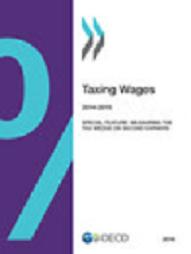Gagnon, Joseph E., (2016), “Quantitative Easing: An Underappreciated Success”, Peterson Institute for International Economics, April After short-term interest rates in many advanced economies fell below 1 percent, central banks turned to quantitative easing (QE) to support economic growth. They purchased massive and unprecedented amounts of long-term bonds in an effort to reduce long-term borrowing costs. Nevertheless, recovery from the Great Recession proved disappointingly slow. Recently, some central banks have pushed short-term …Read More
The Refugee Surge in Europe : Economic Challenges
Aiyar, Shekhar, Barkbu, Bergljot, Batini, Nicoletta, Berger, Helge, Detragiache, Enrica, Dizioli, Allan, Ebeke, Christian, Lin, Huidan, Kaltani, Linda, Sosa, Sebastian, Spilimbergo, Antonio, Topalova, Petia, (2016), “The Refugee Surge in Europe : Economic Challenges”, IMF Staff Discussion Note SDN/16/02, January The dislocation of large parts of the population in Syria and other conflict zones is, first and foremost, a humanitarian catastrophe with important ramifications across many countries in the Middle East, Europe, and beyond. This note focuses on one facet of this complex issue, the economic aspects of the surge in asylum seekers …Read More
Post-crisis International Banking: An Analysis with New Regulatory Survey Data
Ichiue, Hibiki, Lambert, Frederic, (2016), ” Post-crisis International Banking: An Analysis with New Regulatory Survey Data”, IMF WP/16/88, April Foreign bank lending has stopped growing since the global financial crisis. Changes in banks’ business models, balance-sheet adjustments, as well as the tightening of banking regulations are potential drivers of this prolonged slowdown. The existing literature however suggests an opposite effect related to regulation, with tighter regulations encouraging foreign lending through regulatory arbitrage. …Read More
Taxing Wages 2016
OECD, (2016), “Taxing Wages 2016”, OECD Publishing, Paris, April This annual flagship publication provides details of taxes paid on wages in OECD countries. It covers: personal income taxes and employee contributions paid by employees, social security contributions and payroll taxes paid by employers, and cash benefits received by in-work families. It illustrates how these taxes and benefits are calculated in each member country and examines how they have an impact …Read More
How to reform EU fiscal rules
Claeys, Grégory, Darva, Zsolt, (2016), “How to reform EU fiscal rules”, Bruegel, 12 April The austerity policies implemented in many European countries since 2010 have contributed to the poor economic recovery, raising questions about why EU budget rules failed to deliver both economic stabilisation and public debt sustainability. In theory the current rules could do a good job, but in practice they face major hurdles. A key indicator used in the current rules is the structural budget balance. This …Read More
Avoiding The Quick Fix Approach To Solving Youth Unemployment
Riso, Sara, (2016), “Avoiding The Quick Fix Approach To Solving Youth Unemployment”, Social Europe, 13 April A key priority for EU policy makers is to combat high levels of youth unemployment. Supporting young people to start a new business is increasingly regarded as a way to achieve this goal. And yet the understanding of what drives the success and failure of youth entrepreneurship policies remains incomplete. In a rush to deliver …Read More
The EU’s current crisis and its policy effects: research design and comparative findings
Falkner, Gerda, (2016), “The EU’s current crisis and its policy effects: research design and comparative findings”, Journal of European Integration, 24 March The paper summarises a collaborative international research project comparing the impact of the ongoing conglomerate of crises in nine EU policies. All of them saw significant crisis-induced pressures and challenges. Beyond changes in discourse, the crisis-induced pressures have, in many areas, also triggered a rather sizable amount of policy …Read More
Demand decomposition in trade: Quality and taste
Di Comite, Francesco, Thisse, Jacques-François, Vandenbussche, Hylke, (2016), “Demand decomposition in trade: Quality and taste”, Voxeu, 12 April The trade literature has long focused on firms’ productivity as an explanation for export performance. But what about the demand side? This column looks at firms’ appeal in terms of quality and consumer taste. Using Belgian firm-level data, it suggests that tastes could account for 45% of the variation in export quantities across countries. Relevant …Read More
Can only Eurosceptics oppose austerity? How divisions over integration have replaced the left/right divide in the European Parliament
Van der Veer, Harmen, Otjes, Simon, (2016), “Can only Eurosceptics oppose austerity? How divisions over integration have replaced the left/right divide in the European Parliament”, LSE blogs/Europpblog, 12 April How do economic platforms interact with support for European integration?Harmen van der Veer and Simon Otjes write that the dynamics within the European Parliament have undergone a shift since the beginning of the Eurozone crisis. Whereas in previous periods the key divide in the …Read More
Basic Income And Social Democracy
Van Parijs, Philippe, (2016), “Basic Income And Social Democracy”, Social Europe, 11 April The idea of an unconditional basic income is in fashion. From Finland to Switzerland, from San Francisco to Seoul, people talk about it as they have never done. Twice before, basic income was the object of a real public debate, albeit briefly and limited to one country at a time. In both episodes, the centre left played a …Read More





